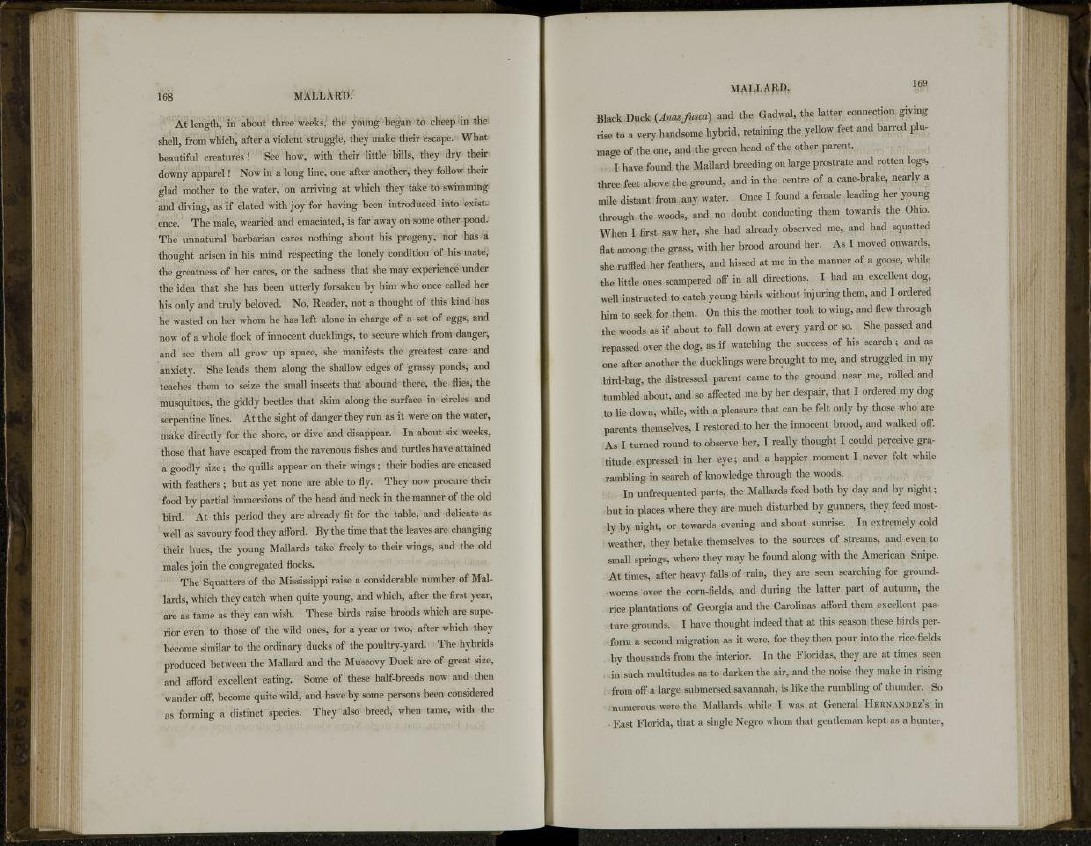
168 MALLARD.
At length, in about three weeks, the young began to cheep in the
shell, from which, after a violent struggle, they make their escape. What
beautiful creatures ! See how, with their little hills, they dry their
downy apparel! Now in a long line, one after another, they follow their
glad mother to the water, on arriving at which they take to swimming
and diving, as if elated with joy for having been introduced into existence.
The male, wearied and emaciated, is far away on some other pond.
The unnatural barbarian cares nothing about his progeny, nor has a
thought arisen in his mind respecting the lonely condition of his mate,
the greatness of her cares, or the sadness that she may experience under
the idea that she has been utterly forsaken by him who once called her
his only and truly beloved. No, Reader, not a thought of this kind has
he wasted on her whom he has left alone in charge of a set of eggs, and
now of a whole flock of innocent ducklings, to secure which from danger,
and see them all grow up apace, she manifests the greatest care and
anxiety. She leads them along the shallow edges of grassy ponds, and
teaches them to seize the small insects that abound there, the flies, the
musquitoes, the giddy beetles that skim along the surface in circles and
serpentine lines. At the sight of danger they run as it were on the water,
make directly for the shore, or dive and disappear. In about six weeks,
those that have escaped from the ravenous fishes and turtles have attained
a goodly size; the quills appear on their wings; their bodies are encased
with feathers ; but as yet none are able to fly. They now procure their
food by partial immersions of the head and neck in the manner of the old
bird. At this period they are already fit for the table, and delicate as
well as savoury food they afford. By the time that the leaves are changing
their hues, the young Mallards take freely to their wings, and the old
males join the congregated flocks.
The Squatters of the Mississippi raise a considerable number of Mallards,
which they catch when quite young, and which, after the first year,
are as tame as they can wish. These birds raise broods which are superior
even to those of the wild ones, for a year or two, after which they
become similar to the ordinary ducks of the poultry-yard. The hybrids
produced between the Mallard and the Muscovy Duck are of great size,
and afford excellent eating. Some of these half-breeds now and then
wander off, become quite wild, and have by some persons been considered
as forming a distinct species. They also breed, when tame, with the
MALLARD. 169
Black Duck (Anasfused) and the Gadwal, the latter connection giving
rise to a very handsome hybrid, retaining the yellow feet and barred plumage
of the one, and the green head of the other parent.
I have found the Mallard breeding on large prostrate and rotten logs,
three feet above the ground, and in the centre of a cane-brake, nearly a
mile distant from any water. Once I found a female leading her young
through the woods, and no doubt conducting them towards the Ohio.
When I first saw her, she had already observed me, and had squatted
flat among the grass, with her brood around her. As I moved onwards,
she ruffled her feathers, and hissed at me in the manner of a goose, while
the little ones scampered off in all directions. I had an excellent dog,
well instructed to catch young birds without injuring them, and I ordered
him to seek for them. On this the mother took to wing, and flew through
the woods as if about to fall down at every yard or so. She passed and
repassed over the dog, as if watching the success of his search ; and as
one after another the ducklings were brought to me, and struggled in my
bird-bag, the distressed parent came to the ground near me, rolled and
tumbled about, and so affected me by her despair, that I ordered my dog
to lie down, while, with a pleasure that can be felt only by those who are
parents themselves, I restored to her the innocent brood, and walked off.
As I turned round to observe her, I really thought I could perceive gratitude
expressed in her eye; and a happier moment I never felt while
rambling in search of knowledge through the woods.
In unfrequented parts, the Mallards feed both by day and by night;
but in places where they are much disturbed by gunners, they feed mostly
by night, or towards evening and about sunrise. In extremely cold
weather, they betake themselves to the sources of streams, and even to
small springs, where they may be found along with the American Snipe.
At times, after heavy falls of rain, they are seen searching for groundworms
over the corn-fields, and during the latter part of autumn, the
rice plantations of Georgia and the Carolinas afford them excellent pasture
grounds. I have thought indeed that at this season these birds perform
a second migration as it were, for they then pour into the rice-fields
by thousands from the interior. In the Floridas, they are at times seen
in such multitudes as to darken the air, and the noise they make in rising
from off a large submersed savannah, is like the rumbling of thunder. So
numerous were the Mallards while I was at General HERNANDEZ'S in
• East Florida, that a single Negro whom that gentleman kept as a hunter.